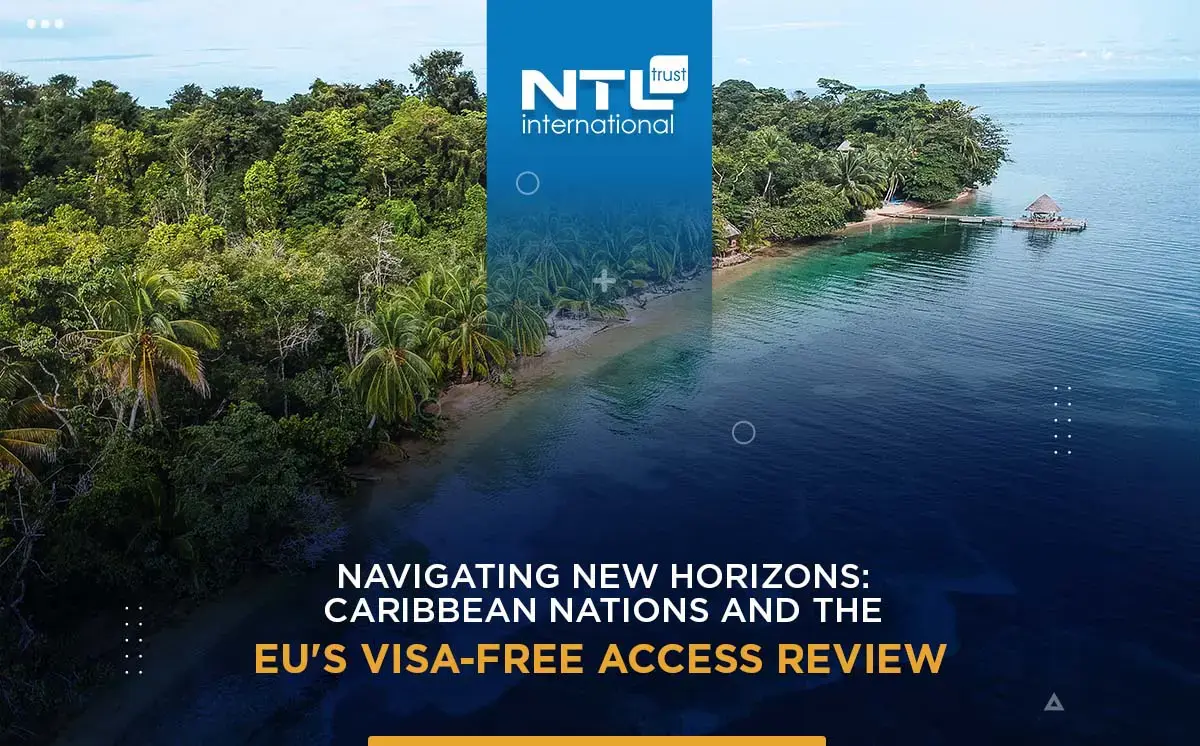
Navigating New Horizons:
Caribbean Nations and the EU’s Visa-Free Access Review
In recent discussions, the potential for the European Union (EU) to adjust its visa-free agreements with Caribbean nations offering Citizenship by Investment (CBI) programs has come to the forefront.
This development is rooted in concerns over security and transparency within these programs.
The EU’s considerations reflect a broader dialogue on the integrity of international travel systems and the importance of stringent vetting processes.
The Implications and Opportunities to the Caribbean nations:
While the prospect of restricted visa-free access presents challenges, it also opens a doorway to significant opportunities for Caribbean nations.
By addressing the EU’s concerns, these countries can enhance the global perception of their CBI programs, demonstrating a commitment to high standards of due diligence and transparency.
This process could not only satisfy EU requirements but also attract a reputable clientele, thereby strengthening the programs’ integrity. Moreover, this situation underscores the importance of economic diversification for Caribbean nations.
Lessening dependence on CBI programs by investing in other sectors – such as renewable energy, digital services, and sustainable tourism – could provide more resilient revenue streams.
Such diversification efforts would contribute to a more stable economic future, reducing vulnerability to international policy shifts.
Read more: CARIFTA Games
Strategic Actions for Caribbean Nations:
To navigate these challenges effectively, Caribbean countries are encouraged to undertake several key actions:
- Enhance Program Transparency: Implementing robust vetting processes and improving transparency around the issuance of citizenship through investment can address security concerns and build trust in these programs.
- Engage in Constructive Dialogue: Proactive engagement with the EU to understand and address concerns, and negotiate terms, is crucial. Diplomatic efforts can pave the way for mutual understanding and potentially prevent restrictive measures.
- Foster Regional Collaboration: A unified approach to standardizing CBI program practices across the Caribbean can strengthen the region’s position in negotiations and ensure consistency in addressing international standards.
Read more: The CARICOM convention
- Prioritize Economic Diversification: By focusing on the development of alternative economic sectors, Caribbean nations can reduce their reliance on CBI programs and build a more diversified and sustainable economic base.
- Strengthen Legal Frameworks: Updating legal frameworks to better combat money laundering and financial crimes will further align Caribbean CBI programs with international best practices, addressing some of the EU’s critical concerns.
The potential review of visa-free access by the EU presents both a challenge and an opportunity for Caribbean nations. By taking proactive steps to reform CBI programs, engage diplomatically with international partners, and pursue economic diversification, the Caribbean can turn this challenge into a catalyst for growth and development.This moment calls for strategic action, collaboration, and innovation to ensure that Caribbean nations continue to thrive in an ever-evolving global landscape.
Nursing Study in Germany Program
By studying nursing in Germany, you will have the opportunity to find a job in the health care field there.
Germany.. The beating heart of the European continent
Germany is the European heart and the most popular country among the countries of the Union. Not only because of its political, economic and industrial role; but rather the combination of its fascinating history and urban culture with modernity and development in all fields of life.
Saint Kitts and Nevis extended the discount for families
The Cabinet of Ministers in Saint Kitts and Nevis has approved the extension of the duration related to reducing the cost of a family of up to four people
Facilities by German Government for Foreign Investors
The German government intends to encourage investors wishing to expand their horizons and achieve their ambitions to invest in one of the strongest global economies, by providing many good, promising, and easy investment opportunities and offering many facilities to attract investments and boost the growth of the German economy.
A tour of Spain and Spanish cuisine
f you are wondering why we advise you to choose Spain for your next vacation, we will not go so far, but did you know that Spain has the most famous international football clubs (Real Madrid and Barcelona) and it is the second country in the world that includes heritage places.





